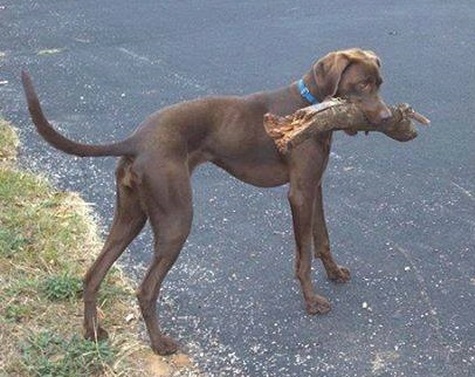This past June, a dog was discovered chained to a jetty in a lakeside Cudahy park, suffering from multiple gunshot wounds. She had to be euthanized. http://www.cbs58.com/news/local-news/Cudahy-police-ask-for-help-in-information--212977121.html In September, a six month old puppy named Jack was shot with a pellet gun in his Wausau backyard. He had to be euthanized. Just this past week, a dog named Zoey was allegedly shot by bow hunters and left to die near her home in Rome. http://www.wsaw.com/home/headlines/Owner-of-Dog-Shot-by-Arrow-Suspects-Hunters-229771741.html
It’s frustrating when animal abusers are not caught or walk out of jail with no more than a slap on the wrist. Inevitably they are free to become pet owners again, putting the new pet at risk of its life.
For years now animal welfare groups have explored ways to identify animal abusers at large in their communities as well as seek ways to prevent them from owning pets again. One solution proposed was the idea of creating an animal abuser registry, much like the state registries in place for sex offenders.
This past October, the No Kill Advocacy Center posted a model legislation on its website called “the Prevention of Cruelty to Animals Act.”
Its purpose, as stated on the website, reads:
“Today, there is currently no means of ensuring that animals are not placed into the hands of convicted animal abusers. An “Animal Abuser Registry” modeled on those laws which currently exist to protect children, would require people convicted of these types of crimes to register with the state. The registry would then be available to shelters, rescue groups, pet stores, breeders, and the public. Abusers would not be permitted to have animals and it would be illegal to give or sell an animal to them.”
Kudos to the No Kill Advocacy Center for putting forth this thoughtful blueprint that advocates can share with their legislators. At the very least, it is stirring further discussion and awareness.
There have been attempts to have animal abuser registries implemented in various states, but no single model of legislation has been adopted. To date, 26 states have heard proposed legislation for animal abuser registries. (Sadly, Wisconsin was not one of them.) While there are always supporters of the idea, there are always detractors. As such, none of the bills introduced has passed as law.
Wayne Pacelle of The Humane Society of the United States weighed in on this topic back in December 2010. At that time he stated the HSUS had reservations about the idea of a registry. http://hsus.typepad.com/wayne/2010/12/animal-cruelty-registry-list.html
Pacelle cited several reasons for this hesitation, including the lack of an animal-related crimes category in the Uniform Crime Report used by law enforcement agencies nationwide. Additionally, he wondered if such a registry would maintain “the right balance between punishment and rehabilitation.”
An excerpt of his blog stated, “Unlike sexual predation—the inspiration for abuse registry systems around the country—animal abuse is not deemed by professionals as a pre-disposed, hard-wired condition. People who abuse animals stand a much better chance of being rehabilitated, especially if identified early at a young age.”
With this HSUS stance nearly three years old now, it would be interesting to see if they have further research or more information that has swayed or reinforced their opinion.
At their recent Animal Law Conference in Stanford, CA, the Animal Legal Defense Fund (ALDF) presented a new approach to the idea of tracking animal abusers. It’s called the ALDF Do Not Adopt Database.
Chris Green, Director of Legislative Affairs for ALDF, explains it this way:
“The Animal Legal Defense Fund is creating a national database of animal abuse convictions that will provide an additional tool for animal shelters, rescues, pet stores & individuals to screen potential adopters and customers. Cities, counties and states will soon simply be able to “opt in” to an existing database by reporting convictions, rather than being tasked with creating and operating separate registries of their own. ALDF's Do Not Adopt database will be open and accessible by anyone, but searchable only by name and date of birth (verifiable by a potential adopter's driver's license). If a name matches, then the database will provide the name, date of birth, type/date/location of offense.”
When asked what the benefits are to this type of system versus the formerly proposed state animal abuser registry, he replied:
“The purpose behind this new approach is to put the emphasis back on having a quantifiable impact on animal welfare, and also to make the legislation more likely to be enacted by states and major cities. Also, having a centralized, national database will allow shelters and rescues all over the country to have one site to gain access to all offender info––sidestepping the problems of negotiating a patchwork of independent, localized registries that are not linked to one another. Animal Control Officers similarly will gain an immediate, mobile means to identify abuser conviction histories during enforcement visits.”
Furthermore Green says that the Do Not Adopt Database will be created and maintained by ALDF, “ensuring its accuracy, consistency and neutrality.”
Here’s what I think. I think that all the major animal welfare groups (ALDF, Best Friends, No Kill Advocacy, HSUS, ASPCA, American Humane Assocation) should collaborate on this critical issue. They should start a healthy dialogue with each other and settle on a model that makes sense for all fifty states and that legislators will embrace on fiscal, practical, policy and emotional levels.
If the ALDF model, or a version of it, makes sense, then all the groups should endorse it. If we all present a united force against animal abusers, then perhaps positive change will take place.
What do you say? Can we come together for a change?
Check out the "Justice for Zoey" Facebook group: https://www.facebook.com/groups/172421646292135/
---- Denice Ryan Martin, an advisor with Wisconsin Voters for Companion Animals, is a freelance writer and licensed social worker based in Genesee. She’d like to hear your thoughts on this topic. E-mail her at [email protected]

 RSS Feed
RSS Feed